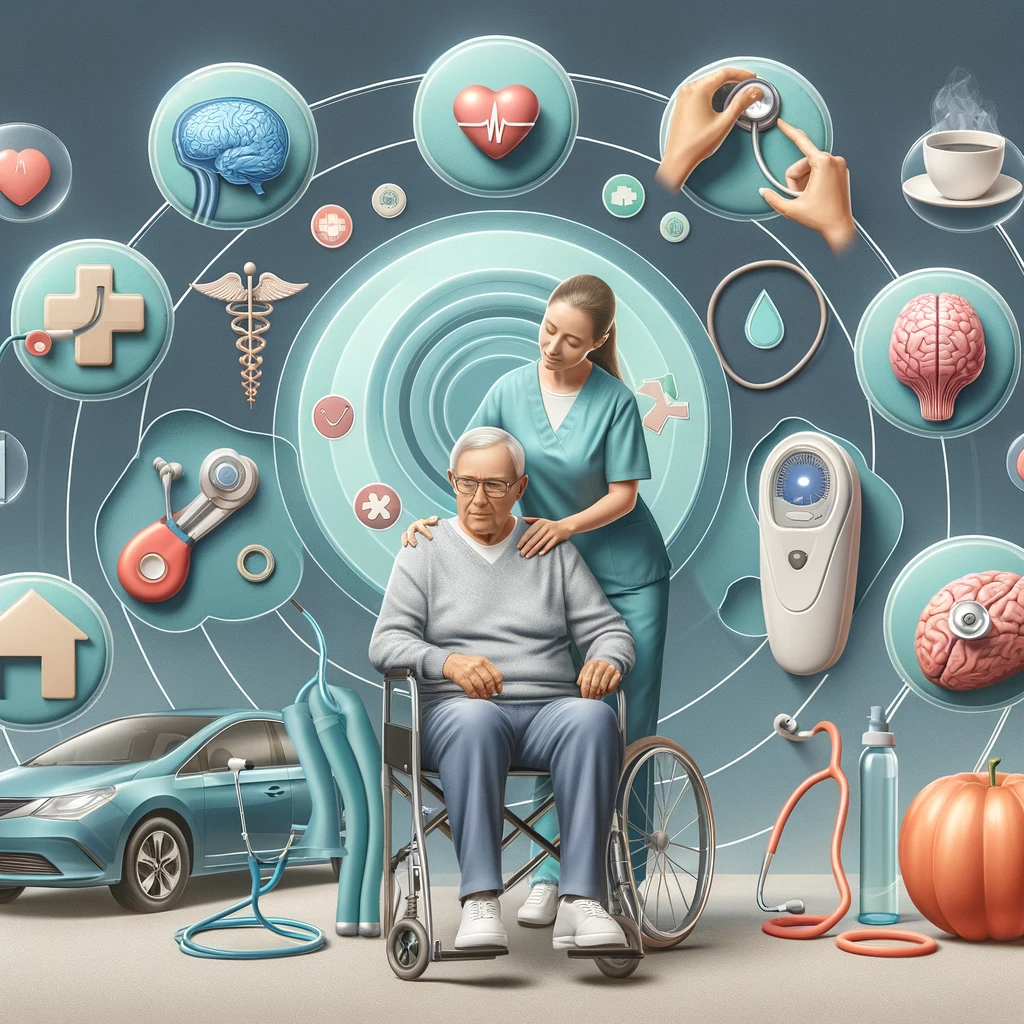Living with a Dementia Person: Navigating Challenges and Exploring Solutions
This guide offers comprehensive insights into living with a dementia person, addressing challenges in care, safety, and emotional support. It provides strategies for financial planning, caregiver support, and understanding disease progression

May is a caregiver asking for help:
This is actually for my husband. He is a caregiver for his stepfather. This situation is impossible.
My husband and I are living at "G-Pa's" house so he can stay in his own home for the rest of his life (he is 91). I feel that moving in with him for 5 years has been enough.
Now he came back home after a 3-month stay in a rehab nursing home after a broken femur. He is even more demented than before, is now in a wheelchair instead of being ambulatory.
He is in diapers, doesn't say when he has to go, and my husband is continually cleaning up feces. I just got out of the hospital for a hip replacement.
This house is too small for all of us, and there is only 1 bathroom. The problems go on.
I do not know what resources are available. I do not know what recourse we have so we can continue to stay in his home.
Please help.
-May
Dear May,
First, I would like to wish you a fast and speedy recovery from your hip surgery.
Caring for a family member with dementia is a journey that brings unique challenges and demands a deep well of compassion and patience. As dementia progresses, it impacts not just the person with the disease but also deeply affects the caregivers and the family dynamics.
This journey, often embarked upon out of love and duty, can become increasingly difficult as the dementia symptoms intensify and the need for specialized care grows.
I have provided you with detailed information to help you along your caregiving journey. Please reach out to me for any further support or concerns.
Warm Regards,
Diane Carbo RN
Caring for a loved one can be overwhelming — but you're not alone. If you have questions, big or small, our expert team is here to help.
👉 Click here to Ask the Expert

Here's more information on Living with a Dementia Person: Navigating Challenges and Exploring Solutions...
Understanding a Dementia Person and Its Progression
Dementia is a general term for a decline in cognitive function severe enough to interfere with daily life. Alzheimer’s disease is the most common cause of dementia, leading to progressive cognitive decline in older adults. It is the most prevalent cause of dementia in older adults, significantly impacting their cognitive abilities. There are other types of dementia like vascular dementia, Lewy body dementia, and frontotemporal dementia. These conditions lead to a gradual deterioration in memory, thinking skills, communication abilities, and the ability to perform everyday tasks. Caregiver support and resources are crucial for managing symptoms and improving the quality of life for individuals affected by Alzheimer’s disease.
As the disease progresses, safety concerns become paramount due to the increased risk of falls, the difficulty in managing personal care, and the potential for dangerous behaviors due to cognitive decline. The person with dementia may experience personality disorders affecting or changes, visual hallucinations, or difficulty remembering and solving problems, which can be distressing for both the individual and their caregivers. Alzheimer's disease places a significant burden on caregivers, who often face emotional, physical, and financial challenges. Traumatic brain injury (TBI), often resulting from repetitive head trauma in individuals such as boxers, football players, or soldiers, can lead to a variety of cognitive and physical symptoms, including depression, memory loss, and impaired speech, which may manifest years after the initial injury. Despite ongoing research aimed at improving treatment options and understanding preventive measures, there is currently no cure for Alzheimer’s disease.
Risk Factors and Causes
Understanding the risk factors and causes of dementia is crucial in taking proactive steps to reduce the likelihood of developing this condition. While some risk factors are beyond our control, others can be managed through lifestyle changes and medical interventions.
Risk Factors:
- Age: The most significant risk factor for dementia is age. The likelihood of developing dementia increases as we get older, with most cases occurring in individuals over the age of 65.
- Family History: Genetics play a role in dementia risk. If you have a family history of dementia, particularly Alzheimer’s disease, your risk of developing the condition is higher.
- Genetics: Certain genetic mutations, such as those associated with early-onset Alzheimer’s disease, can increase the risk of dementia. While these cases are rare, they highlight the importance of genetic factors.
- Lifestyle Factors: A sedentary lifestyle, poor diet, and lack of social engagement can contribute to an increased risk of dementia. Engaging in regular physical activity, maintaining a healthy diet, and staying socially active are important preventive measures.
- Medical Conditions: Conditions like diabetes, high blood pressure, and high cholesterol are linked to an increased risk of dementia. Managing these conditions through medical treatment and lifestyle changes can help reduce this risk.
Causes:
- Alzheimer’s Disease: The most common cause of dementia, accounting for 60-80% of cases. It involves the buildup of amyloid plaques and tau tangles in the brain, leading to cognitive decline. Alzheimer’s disease significantly impacts cognitive function and poses challenges for caregivers. There is currently no cure for Alzheimer’s, but ongoing research aims to improve treatment options and understand preventive measures against its progression. The impact on caregivers is profound, often leading to emotional and physical stress. Ongoing research efforts are focused on understanding and managing Alzheimer's disease to provide better support and treatment options.
- Vascular Dementia: The second most common cause of dementia, resulting from reduced blood flow to the brain, often due to strokes or other vascular conditions.
- Lewy Body Dementia: Characterized by the presence of Lewy bodies in the brain, this type of dementia leads to symptoms such as visual hallucinations and movement disorders.
- Frontotemporal Dementia: A group of diseases that affect the frontal and temporal lobes of the brain, leading to changes in personality, behavior, and language.
- Mixed Dementia: A combination of Alzheimer’s disease and another type of dementia, such as vascular dementia. This can complicate diagnosis and treatment, as symptoms may overlap.
Symptoms and Diagnosis
Recognizing the symptoms of dementia early on is crucial for timely intervention and support. Dementia symptoms can vary depending on the underlying cause and the individual affected, but there are common signs to watch for.
Common Symptoms:
- Memory Loss: One of the most recognizable symptoms of dementia is memory loss, particularly forgetting recent events, learning new information, or recalling familiar words and names.
- Communication and Language: Individuals with dementia may struggle with word-finding, following conversations, or understanding written or spoken language.
- Problem-Solving: Difficulty with abstract thinking, making decisions, or judging time and space can be indicative of cognitive decline.
- Mood Changes: Dementia can lead to mood changes, such as becoming easily agitated, anxious, or depressed.
- Personality Changes: Changes in personality, such as becoming passive, suspicious, or withdrawn, are also common.
Diagnosis:
- Medical Evaluation: A comprehensive medical evaluation is the first step in diagnosing dementia. This includes a thorough medical history, physical examination, and laboratory tests to rule out other conditions that may cause similar symptoms.
- Cognitive and Neuropsychological Tests: These assessments evaluate cognitive function, including memory, language, and problem-solving abilities. They help determine the extent of cognitive decline and identify specific areas of impairment.
- Imaging Tests: Brain scans, such as CT or MRI, are used to identify any underlying brain damage or disease. These imaging tests can help differentiate between different types of dementia and rule out other potential causes of symptoms.

The Role of the Caregiver
In many families, a member like a spouse or adult child takes on the role of the primary caregiver. This role often involves managing medications, assisting with personal activities, adding safety features to the home, and providing emotional support. As the disease progresses, caregivers may find themselves managing more complex medical conditions and dealing with sleep problems, memory loss, thyroid issues, and other health concerns that can arise. Additionally, caregivers may need to manage symptoms related to traumatic brain injury, such as memory loss and impaired speech, which can complicate caregiving.
Creating a Family Member Caregiver Contract
A family caregiver contract is a formal agreement that outlines the responsibilities and expectations of the caregiving relationship. This contract can include details about the scope of care, financial arrangements, and the division of tasks among family members. It helps in setting clear boundaries and expectations, ensuring that the caregiver's efforts are recognized and supported.
Medicaid and Financial Planning for Dementia Care
Caring for a loved one with dementia, such as Alzheimer’s disease, Lewy body dementia, vascular dementia, or frontotemporal dementia, is not only emotionally demanding but also financially taxing. The financial burden of caring for someone with Alzheimer’s disease can be significant, making it essential to plan for long-term care costs. Many families find themselves grappling with the rising costs associated with dementia care, which include medical treatments, personal care needs, safety modifications in the home, and potentially long-term care facilities. The impact of Alzheimer's disease on caregivers is profound, often leading to emotional and physical stress. The lack of a cure for Alzheimer’s disease adds to these challenges, as ongoing research aims to improve treatment options and understand preventive measures against its progression. Medicaid plays a crucial role in easing this financial burden, but understanding and navigating its intricacies is vital for effective planning.
Medicaid Eligibility and Asset "Spending Down"
Medicaid, a state and federally funded program, offers health care coverage including long-term care for individuals with limited income and assets. For a person with dementia, qualifying for Medicaid often involves "spending down" their assets to meet the eligibility criteria set by the state. This process requires a careful and strategic approach to ensure that the necessary resources are used for the person developing dementia's care without jeopardizing their Medicaid eligibility.
Understanding the Impact of Vascular Dementia Progression
As dementia progresses, the person’s cognitive abilities, memory, and capacity to perform everyday tasks diminish. This progression not only escalates the need for comprehensive health care and personal care but also raises safety concerns due to the increased and other risk factors of falls, accidents, and confusion. Traumatic brain injury (TBI), often resulting from repetitive head trauma in individuals such as boxers, football players, or soldiers, can exacerbate cognitive decline and increase the need for comprehensive health care and personal care. Early diagnosis and understanding the specific type of dementia (be it Alzheimer’s, vascular dementia, or another form) are crucial in planning for the future care needs and associated costs.
Dementia Care, Everyday Tasks, and Associated Costs
Dementia care encompasses a wide range of services aimed at managing symptoms, maintaining brain health, and ensuring the safety and well-being of the person with dementia. This may include medical treatments for related conditions like high blood pressure or thyroid problems, specific medical treatments and safety modifications required for individuals with Alzheimer's disease, assistive devices for safety, modifications in the home to manage symptoms or add safety features, and engaging in activities that promote brain health and physical activity.

Planning for Long-Term Care Needs
As the disease progresses, the person with dementia may require more intensive care than can be provided at home. This could involve moving to a specialized dementia care facility or a nursing home. Specialized dementia care facilities are particularly important for individuals with Alzheimer’s disease, as they offer tailored support and resources to manage symptoms and improve quality of life. Alzheimer's disease, being the most common cause of dementia, poses significant challenges for caregivers due to its impact on cognitive function. Additionally, there is currently no cure for neurological dementias like Alzheimer's, but ongoing research aims to improve treatment options and understand preventive measures against its progression. Planning for these potential long-term care needs is a critical aspect of financial planning for families.
Lifestyle and Health Considerations in Financial Planning
Adopting a healthy lifestyle, including a nutritious diet and regular exercise, may play a role in managing some risk factors for dementia, such as high blood pressure and high cholesterol. However, the inevitability of disease progression in cases of Alzheimer’s and other dementias means that families must anticipate the financial implications of long-term care, even with the best preventive measures. The progression of Alzheimer's disease necessitates planning for long-term care despite preventive measures.
Navigating State-Specific Medicaid Rules
Medicaid rules and coverage vary by state, making it essential for families to understand the specific regulations and coverage options available in their area. This can involve doing research suggests consulting with legal and financial experts who specialize in elder care and Medicaid planning.
Support for Caregivers and Families
It’s important for family members and caregivers to take care of their health and well-being while managing the complexities of dementia care. Utilizing available resources related to dementia alone, such as caregiver support groups and educational materials from organizations like the National Institute on Aging, can provide valuable guidance and support. Specifically, for Alzheimer's disease, caregiver support groups and educational materials are crucial in managing symptoms and improving the quality of life for both patients and caregivers.
Financial planning for dementia care, particularly through Medicaid, is a complex but essential process for many families. Understanding the risk factor disease progression, anticipating future care needs, and navigating the legal and financial landscape are crucial steps in ensuring that your loved one with dementia receives the best possible care while maintaining financial stability for the family.
Building a Care Team Partner Support Group and Addressing Safety Concerns
No one should navigate the challenges of dementia caregiving alone. Creating a care team and a partner support group can provide practical assistance to the primary caregiver. This team can include family members, friends, healthcare professionals, and community resources. Support groups offer a space for caregivers to share experiences, offer advice, and find emotional support.
Exploring VA Benefits and Medicaid Waivers
Veterans and their spouses may be eligible for VA benefits that can help cover the cost of care. Additionally, Medicaid waivers can provide financial assistance for home and community-based services, allowing the person with dementia to stay in their home for as long as possible.

Recognizing When It's Time for an Alternative Setting
There may come a time when caring for a person with dementia at home is no longer feasible or safe. Signs that it might be time to consider an alternative setting include an increased need for medical care, a decline in the caregiver or dementia person’s health, safety issues, or the person with dementia’s needs exceeding what can be provided at home. Specific signs for individuals with Alzheimer's disease may include severe memory loss, difficulty with daily activities, and increased behavioral issues.
Living with and caring for someone with dementia is a journey that requires understanding, patience, and a strong support network. Through early diagnosis, understanding the progression of the disease, and leveraging available resources, caregivers can provide compassionate care while also taking care of their own well-being. It’s a path filled with challenges, but also moments of profound connection and love.
Communication and Behavior Challenges
As dementia progresses, individuals may experience communication and behavior challenges that can be distressing for both the person with dementia and their family members. Understanding and addressing these challenges with empathy and patience is essential.
Communication Challenges:
- Language Difficulties: Individuals with dementia often have trouble with word-finding, following conversations, or understanding written or spoken language. Simplifying language, using short sentences, and being patient can help improve communication.
- Nonverbal Communication: Difficulty with nonverbal cues, such as facial expressions, body language, and tone of voice, is common. Paying attention to these cues and using gestures can aid in understanding and expressing needs.
Behavior Challenges:
- Agitation and Aggression: Dementia can lead to increased agitation and aggression. Identifying triggers, maintaining a calm environment, and using soothing techniques can help manage these behaviors.
- Wandering and Restlessness: Pacing, wandering, or restlessness often occur due to boredom, anxiety, or discomfort. Providing engaging activities and ensuring a safe environment can reduce these behaviors.
- Sleep Disturbances: Difficulty sleeping or changes in sleep patterns are common in dementia. Establishing a regular sleep routine and creating a comfortable sleep environment can help improve sleep quality.
Practical Care Strategies
Providing practical care and support can help individuals with dementia maintain their independence and quality of life. Here are some strategies to assist with everyday tasks and address safety concerns.
Everyday Tasks:
- Assist with Daily Activities: Helping with bathing, dressing, grooming, and using the bathroom can ensure that the person with dementia maintains personal hygiene and dignity.
- Manage Medications: Assisting with medication management, including reminders and administration, is crucial to ensure that medications are taken correctly and on time.
- Provide Nutritional Support: Ensuring adequate nutrition and hydration is essential. This includes meal preparation, feeding assistance, and monitoring dietary intake to meet nutritional needs.
Safety Concerns:
- Fall Prevention: Removing tripping hazards, installing handrails, and ensuring proper lighting can help prevent falls and injuries.
- Wandering Prevention: Installing safety devices, such as door alarms and motion sensors, can help prevent wandering and ensure the safety of the person with dementia.
- Emergency Preparedness: Developing an emergency plan, including contact information and a backup plan for care, is essential to ensure that the person with dementia receives prompt assistance in case of an emergency.

Caregiver Support and Self-Care
Caring for a loved one with dementia can be emotionally and physically challenging. It’s essential for caregivers to prioritize their own support and self-care to maintain their well-being.
Caregiver Support:
- Seek Professional Help: Consulting with healthcare professionals, social workers, and support groups can provide valuable guidance and support.
- Respite Care: Arranging for temporary care can provide a much-needed break for caregivers, helping to reduce stress and prevent burnout.
- Support Groups: Joining support groups allows caregivers to connect with others who are experiencing similar challenges, share experiences, and find emotional support.
Self-Care:
- Prioritize Physical Health: Engaging in regular exercise, healthy eating, and ensuring adequate sleep are crucial for maintaining physical health.
- Emotional Well-being: Practicing stress-reducing techniques, such as meditation, yoga, or deep breathing, can help manage emotional stress.
- Social Connections: Maintaining social connections with friends, family, and community members provides emotional support and helps prevent feelings of isolation.
By understanding the risk factors and causes of dementia, recognizing the symptoms and diagnosis, and providing practical care and support, individuals can help reduce the risk of dementia and improve the quality of life for those affected.
You might also like this article:

















